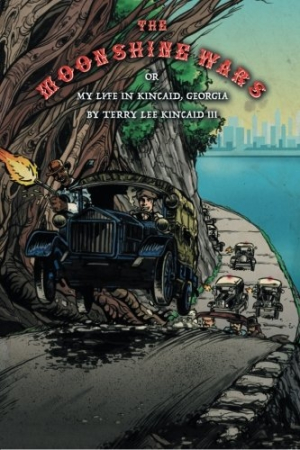The Moonshine Wars
Or My Life in Kincaid, Georgia by Terry Lee Kincaid III
These pages are filled with characters fighting poverty with industriousness and battling discrimination with colorblind friendships.
Set amid the wide-ranging history of the American South and its traditions of bootlegging and white supremacy, The Moonshine Wars describes the lives of several generations of the Kincaid family and their unorthodox relationship with their black family friends, the Spicers. The series of interesting stories is based on author Daniel Micko’s own family history.
The story begins in 1865, touching upon the dark history of slave-hunting and the rise of the Ku Klux Klan after the Civil War. Caught up in conflicting ideologies is Big Terry Lee Kincaid. Generating the smoothest moonshine in the area, he must pay his dues to the Klan in order to continue coexisting with his black partner in the moonshine business, Jim Spicer. The two men have an unusual and unlikely friendship. It’s the knot that binds the Spicer and Kincaid families through the next several generations and lays the foundation for many conflicts to come, both within the families and in the small rural community.
The story is narrated by Big Terry Lee’s grandson, Terry Lee, also known as Little T. His reflections and asides enrich the story, adding depth to his many relations, prominent community figures, and the Spicer clan. Little T’s stories weave in prostitutes, conflicted white pride and early enterprise, wayward youth, and battles of conscience and class. As admirable as it was to battle the current in the tumultuous setting of the South, conflicts come to light between the Kincaids and Spicers, who question Big Terry Lee’s motives and loyalty.
The conversational tone of the writing is engaging, and there are many realistic supporting characters within and surrounding the two main families. Among them are manipulative businessmen with secret lives as Klan leaders, a loving but long-suffering black nanny, a beautiful quadroon wife transplanted from Haiti, and bootlegging Chicago gangs. There is thwarted love between social classes, and throughout is down-home wisdom that resonates in its simplicity. Still, most of the book ambles along without a clear destination, and two of the more fascinating story lines—appearing near the book’s end—fizzle out with no apparent conclusion.
The Moonshine Wars is an informative glimpse into a not-so-forgotten past. Filled with characters fighting poverty with industriousness and battling discrimination with colorblind friendships, there is much to admire within these pages, all set during a time when our country sought to redefine and heal itself, hoping for a better future.
Reviewed by
Felicia Topp
Disclosure: This article is not an endorsement, but a review. The publisher of this book provided free copies of the book and paid a small fee to have their book reviewed by a professional reviewer. Foreword Reviews and Clarion Reviews make no guarantee that the publisher will receive a positive review. Foreword Magazine, Inc. is disclosing this in accordance with the Federal Trade Commission’s 16 CFR, Part 255.


